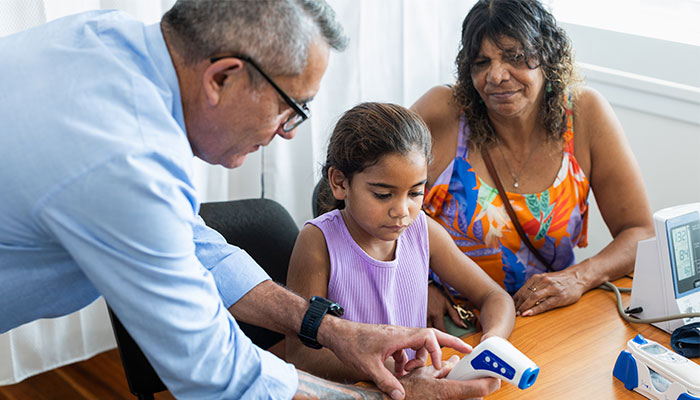A Macquarie University Hearing research team, led by Professor Bamini Gopinath, collated and reviewed data from 72 epidemiological studies that compared various risk factors linked to the incidence of hearing loss.

Surprise findings: powerful medications have emerged as risk factors in the development of hearing loss, says hearing researcher Professor Bamini Gopinath.
In a paper published in Preventative Medicine, the team calculated the pooled incidence – or new cases – of any form of hearing loss for each risk factor, producing a percentage difference between the number of people who had been exposed to the risk and those who had not.
Combined radiotherapy and chemotherapy were associated with the highest incidence at 55.4 per cent, meaning that more than half the people who underwent cancer treatment went on to develop hearing loss.
This was closely followed by the use of powerful antibiotics for diseases such as tuberculosis and pneumonia, with 50 per cent of people who received these treatments also developing hearing loss.
A number of factors are known to affect hearing, including genetic susceptibility, gradual age-related degeneration, noise exposure, some health conditions, lifestyle factors, chronic ear infections, and ototoxicity, which is damage to the ear caused by medication.
- How three hours could add up to a better retirement
- Screen test: How paper still wins in the reading stakes
Professor Gopinath says the team was surprised by the strength of the influence of cancer medication on hearing.
“Some people reported hearing loss during their treatment, but for others it developed later,” she says.
“Both radiotherapy and chemotherapy drugs are risk factors individually, but the highest risk is associated with concurrent radiotherapy and chemotherapy.
“It’s not well understood what it is about radiotherapy that can result in hearing loss, but it may be that radiation damages the sensitive components of the ear.”
Infectious diseases were also an important risk factor, notably COVID-19, which had a 28 per cent incidence of hearing loss.
“When treating infections, clinicians should always consider less-toxic alternatives if available, particularly for people who already have other risk factors, like a family history of hearing loss.
Some viral infections, like measles, rubella and HIV, are known triggers for hearing problems, but there is emerging evidence that some people who contract COVID-19 are experiencing symptoms such as tinnitus, vertigo, and lasting sensorineural hearing loss caused damage to the inner ear.
Professor Gopinath says their findings emphasise the importance of developing less destructive medications.
“There are currently few other alternatives to chemotherapy and radiotherapy for treating most forms of cancer, but this does highlight the importance of monitoring patients’ hearing both during and after treatment,” she says.
“When treating infections, clinicians should always consider less-toxic alternatives if available, particularly for people who already have other risk factors, like a family history of hearing loss.”
Some risk factors for hearing loss, like ageing and needing treatment for cancer, are clearly not controllable, but others, like occupational noise, can be modified.

Triggers: Viral infections such as measles, rubella, HIV and now COVID-19 are known to cause tinnitus, vertigo and hearing loss in some people, says Professor Gopinath.
Occupational noise is responsible for about a quarter of all adult-onset hearing loss. It includes exposure to extremely loud noises, like explosions or gunfire, and to ongoing noise at high levels, like the sound of heavy machinery, power tools or loud music.
It affects sectors including the military, manufacturing, construction, mining, and the music industry, but can be easily prevented by wearing hearing protection in noisy environments.
Professor Gopinath says hearing loss is often dismissed as an inevitable consequence of ageing, and as a result is severely neglected as a health issue.
“Age remains the single biggest determinant in adult-onset hearing loss, but these results remind us that there are other important risk factors that we need to be alert to, and to modify what we can,” she says.
“In cases where we can’t modify the risks, there is a range of treatment options such as hearing aids that can improve people’s quality of life considerably, especially when hearing loss is caught early.”
Professor Bamini Gopinath is Inaugural Cochlear Chair of Hearing Health at Macquarie University Hearing.



